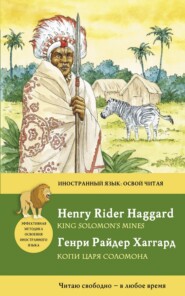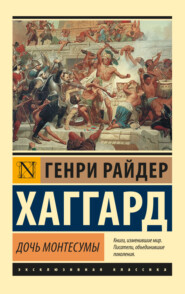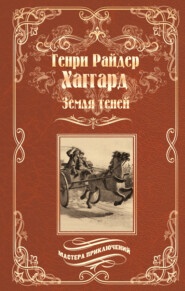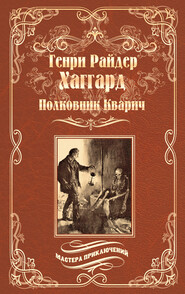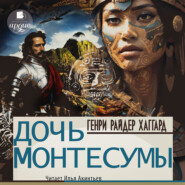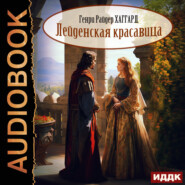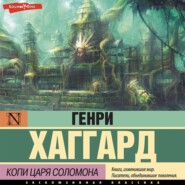По всем вопросам обращайтесь на: info@litportal.ru
(©) 2003-2024.
✖
The World's Desire
Настройки чтения
Размер шрифта
Высота строк
Поля
“So shall things go with us while that False Hathor dwells in Khem.”
Now as she spoke thus, again there came a sound of knocking at the gates and a cry of “Open – a messenger! a messenger!”
“Open!” said Meriamun, “though his tidings be ill, scarce can they match these that have been told.”
The gates were opened, and one came through them. His eyes stared wide in fear, so dry was his throat with haste and with the sand, that he stood speechless before them all.
“Give him wine,” cried Meriamun, and wine was brought. Then he drank, and he fell upon his knees before the Queen, for he knew not Pharaoh.
“Thy tidings!” she cried. “Be swift with thy tidings.”
“Let the Queen pardon me,” he said. “Let her not be wrath. These are my tidings. A mighty host marches towards the city of On, a host gathered from all lands of the peoples of the North, from the lands of the Tulisha, of the Shakalishu, of the Liku, and of the Shairdana. They march swiftly and raven, they lay the country waste, naught is left behind them save the smoke of burning towns, the flight of vultures, and the corpses of men.”
“Hast done?” said Meriamun.
“Nay, O Queen! A great fleet sails with them up the eastern mouth of Sihor, and in it are twelve thousand chosen warriors of the Aquaiusha, the sons of those men who sacked Troy town.”
And now a great groan went up to heaven from the lips of those who hearkened. Only Meriamun spoke thus:
“And yet the Apura are gone, for whose sake, ye say, came the plagues. They are fled, but the curse remains, and so shall things ever be with us while yon False Hathor dwells in Khem.”
III THE BED OF TORMENT
It was nightfall, and Pharaoh sat at meat and Meriamun sat by him. The heart of Pharaoh was very heavy. He thought of that great army which now washed to and fro on the waters of the Sea of Weeds, of whose number he alone had lived to tell the tale. He thought also of the host of the Apura, who made a mock of him in the desert. But most of all he brooded on the tidings that the messenger had brought, tidings of the march of the barbarians and of the fleet of the Aquaiusha that sailed on the eastern stream of Sihor. All that day he had sat in his council chamber, and sent forth messengers east and north and south, bidding them gather the mercenaries from every town and in every city, men to make war against the foe, for here, in his white-walled city of Tanis, there were left but five thousand soldiers. And now, wearied with toil and war, he sat at meat, and as he sat bethought him of the man whom he had left to guard the Queen.
“Where, then, is that great Wanderer, he who wore the golden harness?” he asked presently.
“I have a tale to tell thee of the man,” Meriamun answered slowly, “a tale which I have not told because of all the evil tidings that beat about our ears like sand in a desert wind.”
“Tell on,” said Pharaoh.
Then she bent towards him, whispering in his ear.
As she whispered, the face of Pharaoh grew black as the night, and ere all the tale was done he sprang to his feet.
“By Amen and by Ptah!” he cried, “here at least we have a foe whom we may conquer. Thou and I, Meriamun, my sister and my queen, are set as far each from each as the sky is set from the temple top, and little of love is there between us. Yet I will wipe away this blot upon thy honour, which also is a blot upon my own. Sleepless shall this Wanderer lie to-night, and sorry shall he go to-morrow, but to-morrow night he shall sleep indeed.”
Thereupon he clapped his hands, summoning the guard, and bade them pass to the dungeon where the Wanderer lay, and lead him thence to the place of punishment. He bade them also call the tormentors to make ready the instruments of their craft, and await him in the place of punishment.
Then he sat for awhile, drinking sullenly, till one came to tell him that all was prepared. Then Pharaoh rose.
“Comest thou with me?” he asked.
“Nay,” said Meriamun, “I would not look upon the man again; and this I charge thee. Go not down to him this night. Let him be found upon the bed of torment, and let the tormentors give him food and wine, for so he shall die more hardly. Then let them light the fires at his head and at his feet and leave him till the dawn alone in the place of torment. So he shall die a hundred deaths ere ever his death begins.”
“As thou wilt,” answered Pharaoh. “Mete out thine own punishment. To-morrow when I have slept I will look upon his torment.” And he spoke to his servants as she desired.
The Wanderer lay on the bed of torment in the place of torment. They had taken the gag from his mouth, and given him food and wine as Pharaoh commanded. He ate and drank and his strength came back to him. Then they made fast his fetters, lit the braziers at his head and foot, and left him with mocking words.
He lay upon the bed of stone and groaned in the bitterness of his heart. Here then was the end of his wanderings, and this was the breast of the Golden Helen in whose arms Aphrodite had sworn that he should lie. Oh, that he were free again and stood face to face with his foes, his harness on his back! Nay, it might not be, no mortal strength could burst these fetters, not even the strength of Odysseus, Laertes’ son. Where now were those Gods whom he had served? Should he never again hear the clarion cry of Pallas? Why then had he turned him from Pallas and worshipped at the shrine of the false Idalian Queen? Thus it was that she kept her oaths; thus she repaid her votary.
So he thought in the bitterness of his heart as he lay with closed eyes upon the bed of torment whence there was no escape, and groaned: “Would, Aphrodite, that I had never served thee, even for one little hour, then had my lot gone otherwise.”
Now he opened his eyes, and lo! a great glory rolled about the place of torment, and as he wondered at the glory, a voice spoke from its midst – the voice of the Idalian Aphrodite:
“Blame me not, Odysseus,” said the heavenly voice; “blame me not because thou art come to this pass. Thyself, son of Laertes, art to blame. What did I tell thee? Was it not that thou shouldst know the Golden Helen by the Red Star on her breast, the jewel whence fall the red drops fast, and by the Star alone? And did she not tell thee, also, that thou shouldst know her by the Star? Yet when one came to thee wearing no Star but girdled with a Snake, my words were all forgotten, thy desires led thee whither thou wouldst not go. Thou wast blinded by desire and couldst not discern the False from the True. Beauty has many shapes, now it is that of Helen, now that of Meriamun, each sees it as he desires it. But the Star is yet the Star, and the Snake is yet the Snake, and he who, bewildered of his lusts, swears by the Snake when he should have sworn by the Star, shall have the Snake for guerdon.”
She ceased, and the Wanderer spoke, groaning bitterly:
“I have sinned, O Queen!” he said. “Is there then no forgiveness for my sin?”
“Yea, there is forgiveness, Odysseus, but first there is punishment. This is thy fate. Never now, in this space of life, shalt thou be the lord of the Golden Helen. For thou hast sworn by the Snake, and his thou art, nor mayest thou reach the Star. Yet it still shines on. Through the mists of death it shall shine for thee, and when thou wakest again, behold, thine eyes shall see it fitfully.
“And now, this for thy comfort. Here thou shalt not die, nor by torment, for thy death shall come to thee from the water as the dead seer foretold, but ere thou diest, once more thou shalt look upon the Golden Helen, and hear her words of love and know her kiss, though thine she shall not be. And learn that a great host marches upon the land of Khem, and with it sails a fleet of thine own people, the Achæans. Go down and meet them and take what comes, where the swords shine that smote Troy. And this fate is laid upon thee, that thou shalt do battle against thy own people, even against the sons of them by whose side thou didst fight beneath the walls of Ilios, and in that battle thou shalt find thy death, and in thy death, thou Wanderer, thou shalt find that which all men seek, the breast of the immortal Helen. For though here on earth she seems to live eternally, it is but the shadow of her beauty that men see – each as he desires it. In the halls of Death she dwells, and in the garden of Queen Persephone, and there she shall be won, for there no more is beauty guarded of Those that stand between men and joy, and there no more shall the Snake seem as the Star, and Sin have power to sever those that are one. Now make thy heart strong, Odysseus, and so do as thy wisdom tells thee. Farewell!”
Thus the Goddess spoke from the cloud of glory, and lo! she was gone. But the heart of the Wanderer was filled with joy because he knew that the Helen was not lost to him for ever, and he no more feared the death of shame.
Now it was midnight, and Pharaoh slept. But Meriamun the Queen slept not. She rose from her bed, she wrapped herself in a dark cloak that hid her face, and taking a lamp in her hand, glided through the empty halls till she came to a secret stair down which she passed. There was a gate at the foot of the stair, and a guard slept by it. She pushed him with her foot.
He awoke and sprang towards her, but she held a signet before his eyes, an old ring of great Queen Taia, whereon a Hathor worshipped the sun. Then he bowed and opened the gate. She swept on through many passages, deep into the bowels of the earth, till she came to the door of a little chamber where a light shone. Men talked in the chamber, and she listened to their talk. They spoke much and laughed gleefully. Then she entered the doorway and looked upon them. They were six in number, evil-eyed men of Ethiopia, and seated in a circle. In the centre of the circle lay the waxen image of a man, and they were cutting it with knives and searing it with needles of iron and pincers made red-hot, and many instruments strange and dreadful to look upon. For these were the tormentors, and they spoke of those pains that to-morrow they should wreak upon the Wanderer, and practised them.
But Meriamun, who loved him, shivered as she looked, and muttered thus beneath her breath:
“This I promise you, black ministers of death, that in the same fashion ye shall die ere another night be sped.”
Then she passed into the chamber, holding the signet on high, and the tormentors fell upon their faces before her majesty. She passed between them, and as she went she stamped with her sandalled foot upon the waxen image and brake it. On the further side of the chamber was another passage, and this she followed till she reached a door of stone that stood ajar. Here she paused awhile, for from within the chamber there came a sound of singing, and the voice was the Wanderer’s voice, and thus he sang:
“Endure, my heart: not long shalt thou endure
The shame, the smart;
The good and ill are done; the end is sure;
Endure, my heart!
There stand two vessels by the golden throne
Of Zeus on high,
From these he scatters mirth and scatters moan,
To men that die.
And thou of many joys hast had thy share,
Thy perfect part;
Battle and love, and evil things and fair;
Endure, my heart!
Fight one last greatest battle under shield,
Wage that war well:
Then seek thy fellows in the shadowy field
Of asphodel,
There is the knightly Hector; there the men
Who fought for Troy;
Shall we not fight our battles o’er again?
Were that not joy?
Though no sun shines beyond the dusky west,






